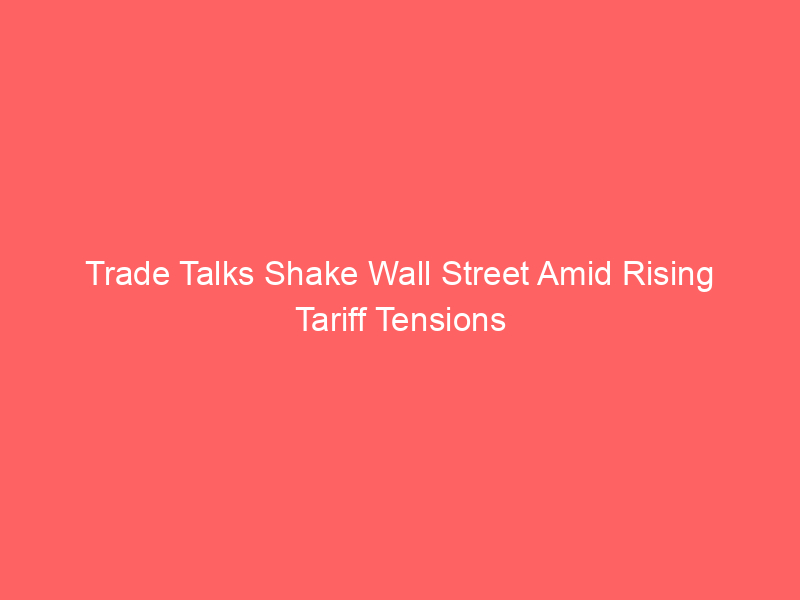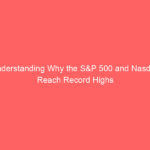In recent weeks, escalating tensions in global trade negotiations have taken center stage on Wall Street, causing ripples through financial markets. As the U.S. and other major economies engage in tense tariff discussions, investors are growing increasingly concerned about potential disruptions to global supply chains and economic growth. These trade talks are not only a matter of international diplomacy but are also directly impacting investor confidence and market stability.
Wall Street Reacts to Escalating Tariff Negotiations
Wall Street’s reaction to the ongoing tariff tensions has been notably volatile. Major indices like the Dow Jones Industrial Average and the S&P 500 experienced sharp swings, reflecting investor anxiety over the uncertain outcome of trade negotiations. The prospect of new tariffs or the escalation of existing ones has prompted traders to adopt a cautious stance, pulling back from aggressive investments and seeking safer assets such as gold and government bonds. This heightened volatility underscores how deeply intertwined global trade policy is with financial market performance.
Market analysts warn that the uncertainty surrounding tariff negotiations could lead to increased market instability. Companies that heavily rely on international supply chains are particularly vulnerable, and their earnings forecasts are being recalibrated to account for possible tariff hikes. Additionally, sectors like technology, manufacturing, and agriculture are feeling the immediate impact, as tariffs threaten to raise costs and reduce competitiveness. In some cases, investors are even beginning to question whether trade tensions could trigger a slowdown in economic growth, further dampening market sentiment.
Despite these jitters, some experts believe that markets may have already priced in a worst-case scenario, rendering the current volatility a temporary phenomenon. Nevertheless, the possibility of prolonged trade disputes continues to cast a shadow over Wall Street, prompting a wait-and-see approach among many institutional investors. As negotiations proceed, market watchers remain alert, scrutinizing every development for signs of resolution or further escalation.
Investors Brace for Uncertain Outcomes in Trade Discussions
Amid the turbulence, investors are increasingly cautious, preparing for a range of possible outcomes from the ongoing trade talks. Some are placing bets on a swift resolution that could ease tensions and stabilize markets, while others are hedging against a protracted conflict that could have lasting repercussions. This strategic positioning reflects the high stakes involved; a positive breakthrough might boost stocks and confidence, whereas a breakdown could plunge markets into deeper turmoil.
The uncertainty has also prompted institutional investors to diversify their portfolios further, reducing exposure to sectors most vulnerable to tariff-related disruptions. Many are increasing their holdings in safe-haven assets, such as U.S. Treasuries and precious metals, to mitigate potential losses from adverse trade developments. Additionally, some firms are revising their supply chain strategies, considering options to diversify sourcing and production to avoid over-reliance on specific countries or regions.
Looking ahead, investors remain vigilant for signals from policymakers and negotiators. Key deadlines, statements, and policy shifts could sway market direction significantly. While optimism about a quick resolution persists among some market participants, the prevailing sentiment remains cautious, with many prepared for a scenario where trade tensions drag on. As the negotiations unfold, the investment community continues to navigate this uncertain terrain with a mix of prudence and strategic foresight.
As trade talks continue to dominate headlines and influence market movements, Wall Street’s outlook remains clouded with uncertainty. The outcome of these tariff negotiations will have far-reaching implications, not just for global commerce but also for investor confidence and economic stability. While volatility is likely to persist in the near term, prudent investors are staying alert and adjusting their strategies accordingly, awaiting a clearer picture of how these tensions will ultimately unfold. In a world where trade policies can shift rapidly, staying informed and prepared has never been more crucial.









Pingback: Tesla Shares Drop Amid Elon Musk's Political Party Announcement - Zero Delay